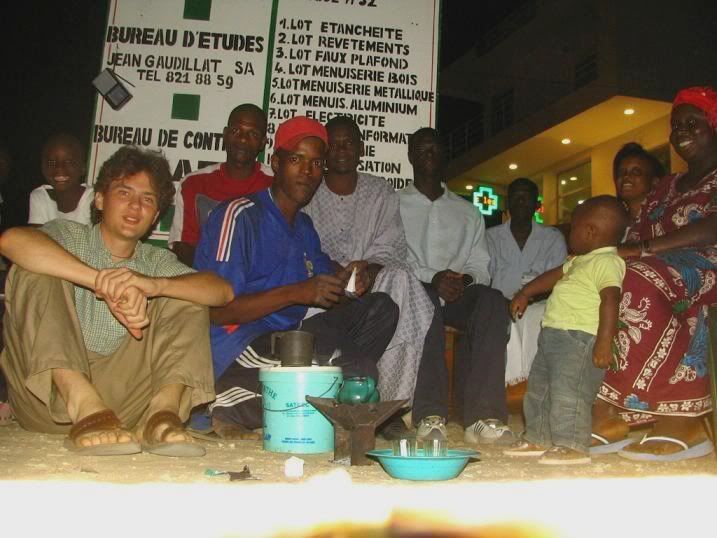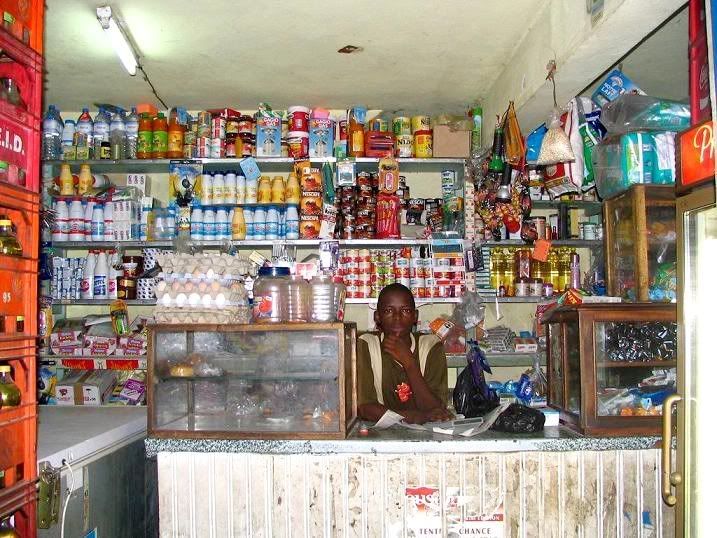Samay xaritu Senegal - My Senegalese Friends
I think it is when I am with my Senegalese friends, more than at any other time, that I feel I am getting 'past the surface.' Though I haven't exactly met them in throngs, it has been incredibly reassuring to feel I can really trust someone, and talk to him seriously.
It's a relief to know that what awaits me on the other side of the initial greetings is more than such convertsational classics as "You're not French, right?" "Senegal is really cool!" or "America is perfect. Your life is perfect, too." Then, of course, there's the persistant, "How about all the beautiful girls in Senegal? Don't you want to marry that one? No, of course your American 'fiancée' isn't enough; you need someone here!" (To clarify, my girlfriend and I are not engaged. However, calling her my fiancée at least diffuses the preceeding conversation before it escalates into marriage arrangements.)
But back to friends. I'm writing about them first, before describing my neighborhood, my family, or my classes partially out of an obstinant refusal to do things logically, but also because they are the most important reminder for me, that I am 'actually here' - that my life here is legitimate and progressing normally.
This is my best friend, Sadjo Diallo. He is a jaaykat, a street vendor on a busy corner near the modern Elton gas station. Mounded up on his cart are found a hundred kinds of sweet cookies; plastic-wrapped batteries; bitter white kola nuts from Nigeria; green bananas and spoiled mandarins; along with incredibly popular American and less-known Senegalese cigarettes.
 In addition there are tiny bags of pon, an as of yet unidentified substance that is rolled into cigarettes. Everyone here calls it tabacco, but we believe, since it is evidently produced from the leaves of a giant tree, that it may not in fact be Nicotiana tabacum. These varied goods are currently supplemented by sweet, dried dates, which are purchased in great quantities in the late afternoon, used to break the day's Ramadan fast.
In addition there are tiny bags of pon, an as of yet unidentified substance that is rolled into cigarettes. Everyone here calls it tabacco, but we believe, since it is evidently produced from the leaves of a giant tree, that it may not in fact be Nicotiana tabacum. These varied goods are currently supplemented by sweet, dried dates, which are purchased in great quantities in the late afternoon, used to break the day's Ramadan fast.Sadjo is 21 years old, though his weathered face and distinct lack of teeth led me to vastly overestimate his age at first. During his life he has been an apprenti on the car rapides, worked as a street mechanic, driven a taxi in Mauritania, and lived alone in the rural southeast of Senegal, watching his family's herd of cattle.
He's a strict and persistant Wolof instructor, insisting that I write down each new lesson, and he's also taught me how to make attaya (Senegalese tea). In return, I'm helping him with his English, which already isn't bad. I'm trying to focus on practical everyday phrases, such as "Hey driver, grab some kolas and let's hit the road!" I also try to assist in selling his wares, though my slow comprehension of Wolof numbers (whose normal meaning changes when they are applied to sums of money) and my clumsy fingers mean that I quickly frustrate the taxi drivers waiting for their handful of cigarettes.
Anyway, I sit out many nights with Diallo, as he's called, and a whole group of people - guards, peanut vendors, contruction workers, and passers-by who find themselves inexplicably thrown together at the corner. We drink the three, slow rounds of attaya, practice our languages, and discuss the business of Dakar, the qualities of friends, and whatever strikes us as most important in life. A few days ago we lost Moustapha 'Six' one of the guards from the group, and a friend. His company posted him to Richard Toll in the far north of Senegal, to guard a sugar factory. This genuinely saddened me, and it felt very good to realize that I really care about my friends here. Perhaps Diallo and I will make a trip up north some weekend to visit Moustapha.
(At the Elton corner, from right: Aissatou, unknown, Aissatou's younger son, Moustapha, Moussa, Abdhul, Sadjo, unkown, me, Aissatou's older son)

I'll write about one more friend: Bouboucar Ba, the young boy who works in a boutique near my house in Mermoz. He was born in Guinea-Conakry, as it's called here, where he went to primary school. Once he was older, however, his father moved with him to Gambia so that he could attend an English-speaking school. Bouboubar lived there for several years, making it to 5th form. However, his father died last May, leaving him with no family and nowhere to live. He came to Dakar to stay with the Ba's, family friends who could offer him a job in their boutique. He stands at the counter during the night's long hours, quickly dishing out supplies to patrons from the packed shelves behind him.
I was drawn to him because of his English, but also because of his sharp and defiant manners. When I initially tried to haggle over his goods, he halted me fiercely, explaining with pride that God was watching him, and so he could never inflate a price for a toubab.
 Bouboucar now earns 20.000 CFA (40 dollars) a month, and is saving to attend the British Academy school in Dakar. I go to see him quite regularly to ask how work is coming along and give him a chance to practice English. When he heard that I'd taught an English lesson at l'Ecole de la rue in the Medina, he asked if he could come along the next time. Right now, I'm a little afraid to return to his shop, however, as I promised I'd have this photos printed out for him a week ago. He will not let me off easy on this breach of trust.
Bouboucar now earns 20.000 CFA (40 dollars) a month, and is saving to attend the British Academy school in Dakar. I go to see him quite regularly to ask how work is coming along and give him a chance to practice English. When he heard that I'd taught an English lesson at l'Ecole de la rue in the Medina, he asked if he could come along the next time. Right now, I'm a little afraid to return to his shop, however, as I promised I'd have this photos printed out for him a week ago. He will not let me off easy on this breach of trust.


0 Comments:
Enregistrer un commentaire
<< Home